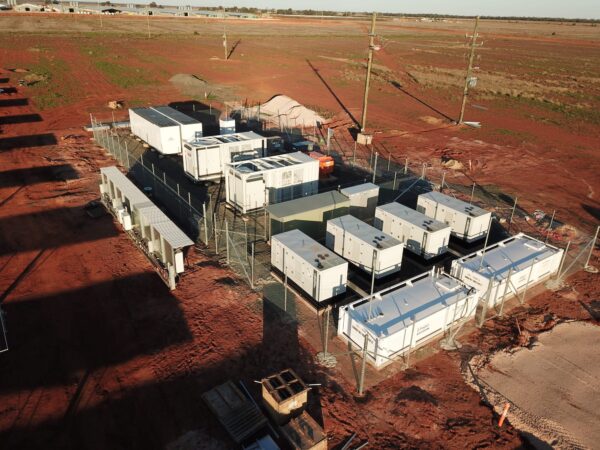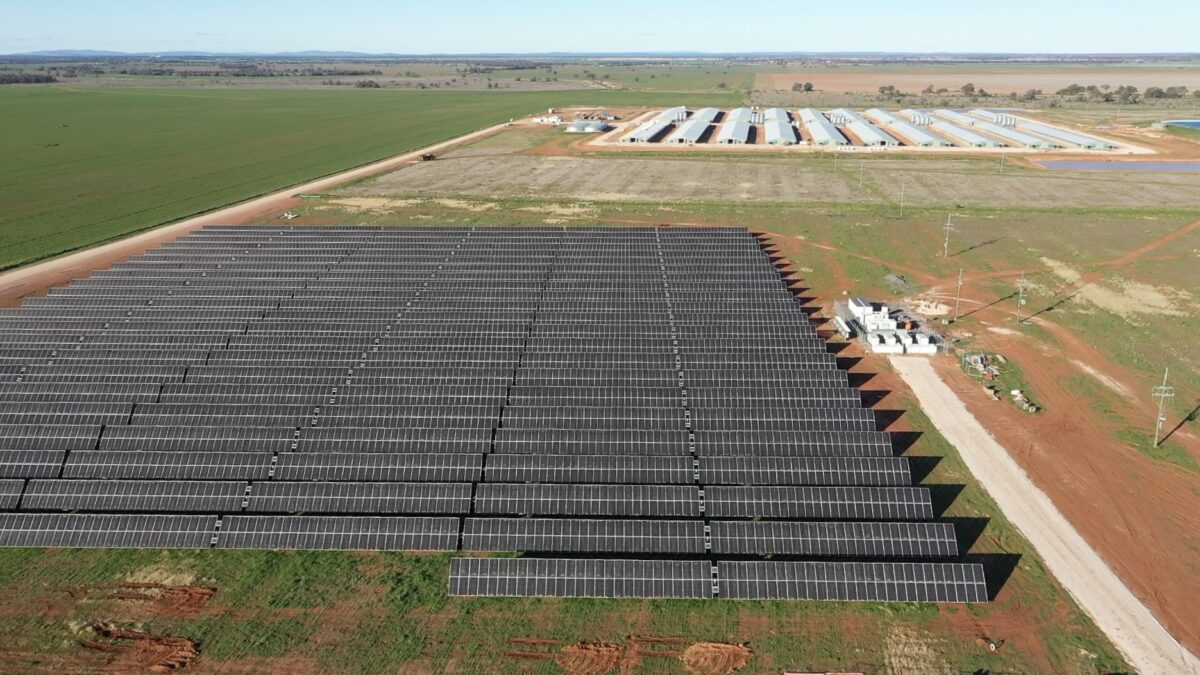Sydney-headquartered Smart Commercial Solar has pulled the covers off an off-grid solar and battery-based system that is powering poultry grower Agright’s new large-scale Meriki chicken farming operation about 150 kilometres west of Griffith in regional New South Wales (NSW) with 100% renewable energy.
Smart Commercial founder and Managing Director Huon Hoogesteger said the system comprises 3.98 MW of ground-mounted solar panels, a 3.4 MVA PV inverter and another 3.45 inverter which charges the battery that has 4.4 MWh of battery storage. This is backed up by 2 MVA of synchronous generators with diesel generators providing another level of redundancy.
From the central location, power is distributed through an 11 kV line stretching 4.2 kilometres in three directions. The energy generated by the microgrid is powering a small village of six staff houses, 40 large chicken barns and associated buildings and infrastructure including freezers and pumps that deliver water from an 80 million litre dam across the site.
“This would have to be the most significant commercial solar and storage-driven off-grid project in Australia, if not the world,” Hoogesteger said.
“Not only is it a landmark in terms of its capability, but it also shows that operating in remote Australia is no longer a barrier for businesses.”
The Meriki microgrid was electrified in March 2024 and while full data on generation and financial implications is still pending, Hoogesteger said early results are in line with predictions.
“We’re collecting a lot of data now and the early results are broadly in line with productive predictions,” he said.
“So far the results are good in that we have produced pretty much all their power with no need for back-up diesel generation since the start. The solar and battery system is holding up really well.”

Image: Smart Commercial Solar
Such has been the success of the Meriki microgrid, Agright Chief Executive Officer Daniel Bryant said the company is now working with Smart Commercial to connect the system to the grid to offset power supply for another large-scale poultry farm being built about nine kilometres away.
“The plan is to endeavour to put a grid connection into both this farm and that next farm and we will supply power to both farms via a B2B sales agreement where we’ll basically sell power down to the new farm,” he said.
“That means we don’t have to establish another large-scale solar and battery installation. We can use this same one to power the second farm if we offset the draw demand from both farms.”
Bryant said network operator Essential Energy is supportive of the concept and “design is being undertaken as we speak.”
Smart Commercial said the solar plant is capable of generating 7,635 MWh of renewable energy per annum while the estimated annual load demand for the Meriki farm is assumed at 2,911 MWh, meaning the solar is often ramped down when the batteries reach full capacity.
“The amount of solar that we could produce, that is not produced because the batteries reach full, is about 50% across the course of a year,” Hoogesteger said.
“So by grid connecting this or even providing this power down to another farm, even if it were a private connection, we would be able to utilise all of the solar potential.”
Hoogesteger said in addition to providing renewable energy for the second farming operation, the project will also provide a potential revenue stream for Agright, which is owned by Australian private equity fund manager Pacific Equity Partners.
“Because the plan is to connect up and augment the line back to the zone sub for Essential Energy, Agright will be able to trade this renewable energy out into the market both for FCAS and spot market trades,” he said.
“So there is potential for a new revenue stream that wasn’t foreseen in the original modelling.”
This content is protected by copyright and may not be reused. If you want to cooperate with us and would like to reuse some of our content, please contact: editors@pv-magazine.com.









1 comment
By submitting this form you agree to pv magazine using your data for the purposes of publishing your comment.
Your personal data will only be disclosed or otherwise transmitted to third parties for the purposes of spam filtering or if this is necessary for technical maintenance of the website. Any other transfer to third parties will not take place unless this is justified on the basis of applicable data protection regulations or if pv magazine is legally obliged to do so.
You may revoke this consent at any time with effect for the future, in which case your personal data will be deleted immediately. Otherwise, your data will be deleted if pv magazine has processed your request or the purpose of data storage is fulfilled.
Further information on data privacy can be found in our Data Protection Policy.